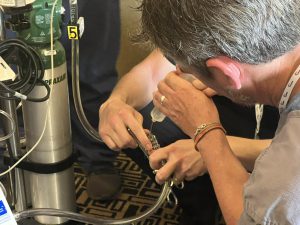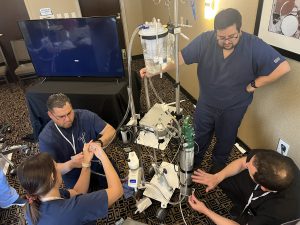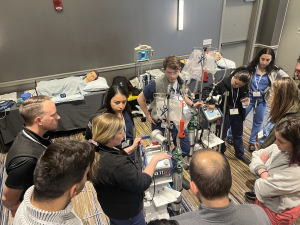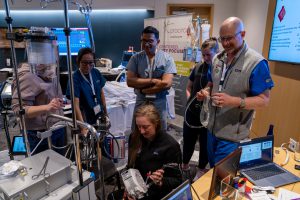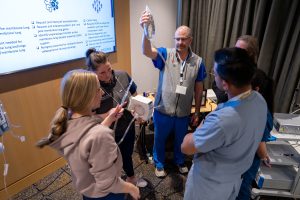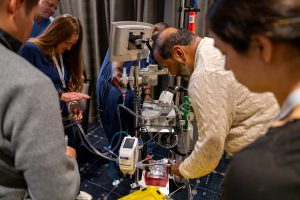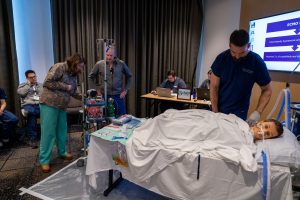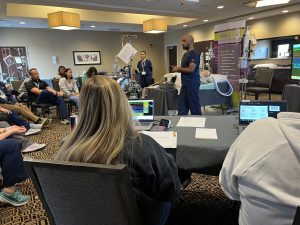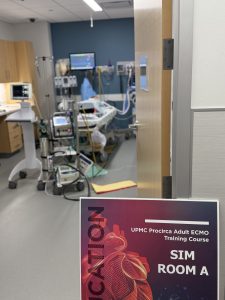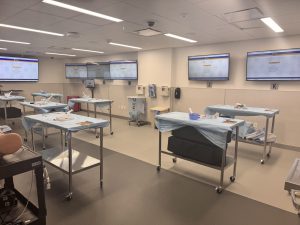The first training course in North America to achieve ELSO endorsement, Procirca’s offering is distinguished by the superiority and scope of its didactic content and immersive simulations. The course features didactic sessions lead by clinical domain experts from critical care medicine, cardiothoracic surgery, and perfusion services along with high-fidelity simulations, thus giving the learner a thorough knowledge base of ECMO.
The course meets Step 1 and Step 2 requirements for the ELSO Adult ECMO certification Exam (E-AEC). Held in person in Pittsburgh, Pennsylvania, this comprehensive adult ECMO training program is a three-day course designed for all bedside ECMO caregivers, including physicians, physician assistants, perfusionists, nurses, nurse practitioners, ECMO specialists, and respiratory therapists.
DAY 1 (THURSDAY, OCTOBER 16, 2025):
7:00-7:30 a.m. Registration and Breakfast
7:30-8:00 a.m. Welcome and Overview
Keri Hickman, CCP
ECMO OVERVIEW
Different modes of ECMO support
Global trends in ECMO utilization
8:00-9:00 a.m. Past to Present: History and Recent Evidence
Holt Murray, MD
HISTORY OF ECMO
List the key milestones in the development of ECMO
Describe the evolution of the Extracorporeal Life Support Organization
HISTORICAL STUDIES
List the historical ECMO studies and their limitations
RECENT EVIDENCE FOR VV ECMO
Interpret results and limitations of the main cohort studies on VV ECMO
Interpret results and limitations of the CESAR and the EOLIA trials
RECENT EVIDENCE FOR VA ECMO
Interpret results and limitations of the main cohort studies on VA ECMO
Interpret results of studies/trials comparing temporary VADs to VA ECMO
8:30-9:00 a.m. Circuit Components
Brandon D’Aloiso, CCP
CIRCUIT OVERVIEW
Define the main components of an ECMO circuit
List circuit monitoring tools
CANNULAS & TUBING
Describe the differences in ECMO cannula design
List the considerations for selecting the appropriate ECMO cannula
PUMP
Describe the requirements of a blood pump used in ECMO
Explain the physics and working principles of a centrifugal pump
MEMBRANE LUNG & BLENDER
Describe the structure and function of the membrane lung
Describe the function of the blender
PRESSURE MONITORING
List the different pressure zones in an ECMO circuit
Discuss the utility of monitoring drainage pressure
OTHER CIRCUIT COMPONENTS
Describe the utility of the flowmeter
Describe the function of the heater
Describe the utility of circuit clamps
9:00-9:30 a.m. Configurations & Cannulations
Michael Lazar, MD
CANNULATION
List the differences between percutaneous and open cannulation
Outline the process of percutaneous cannulation
Discuss the role of ultrasound in cannulation
VV ECMO CONFIGURATIONS
List the different configurational options for VV ECMO
Review the benefits and limitations of specific configurations
VA ECMO CONFIGURATIONS
List the different configurational options for VA ECMO
Review benefits and limitations of specific configurations
CANNULATION COMPLICATIONS
Identify complications of ECMO cannulation
Describe steps to prevent, recognize, and treat complications
9:30-9:45 a.m. Break
9:45-10:30 a.m. ECMO Physiology
Raj Ramanan, MD
OXYGEN DELIVERY & UPTAKE
Describe the normal physiology of oxygen delivery and uptake
GAS TRANSFER IN MEMBRANE LUNG
Describe the key determinants of oxygen uptake in the membrane lung
Describe the key determinants of carbon dioxide removal in the membrane lung
HEMODYNAMIC MONITORING OF VV
List the hemodynamic changes that accompany VV ECMO
Describe the changes in hemodynamic monitoring on VV ECMO
HEMODYNAMIC MONITORING OF VA
Discuss the hemodynamic changes that accompany VA ECMO
Describe the changes in hemodynamic monitoring on VA ECMO
10:30-11:00 a.m. Anticoagulation
Ryan Rivosecchi, PharmD
ANTICOAGULATION
List anticoagulation strategies on ECMO
Discuss anticoagulation monitoring on ECMO
11:00-11:30 a.m. Daily Management for the ECMO Specialist
Amber Palmer, CCP
RENAL REPLACEMENT THERAPY
Identify the benefits and limitations of administering RRT via a dialysis catheter
Identify the benefits and limitations of administering RRT via the ECMO circuit
INTRAHOSPITAL TRANSPORT
Identify considerations and logistics for intrahospital transport
11:30 a.m. – 12:30 p.m. Lunch
12:30-1:00 p.m. Daily Management for the ECMO Provider
Tim Kaselitz, MD
SEDATION
Identify the role of sedation during ECMO support
Discuss the paradigm shift towards awake ECMO
PROCEDURES
Discuss considerations for procedures on the ECMO patient
PHYSIOTHERAPY
Describe the rationale for physiotherapy during ECMO
Identify appropriate candidates for physiotherapy on ECMO
1:00-1:15 p.m. Introduction to Simulation
Keri Hickman, CCP
1:15-5:00 p.m. Simulations
Instructors: Raj Ramanan, Veronica Garvia-Bianchini, Tim Kaselitz, Keri Hickman, Brandon D’Aloiso, Amber Palmer, Tyler Eadie
5:15 p.m. Adjournment Day One
DAY 2 (FRIDAY, OCTOBER 17):
7:00-7:30 a.m. Breakfast/Sign In
7:30-8:00 a.m. Respiratory Failure
Veronica Garvia-Bianchini, MD
Provide an overview of respiratory failure
List standard management strategies for respiratory failure
Discuss the rationale of VV ECMO in respiratory failure
8:00-8:30 a.m. Patient Selection for VV ECMO
Raj Ramanan, MD
List the indications and contraindications for VV ECMO support
8:30-9:00 a.m. Management of VV ECMO
Raj Ramanan, MD
INTIATION OF VV ECMO
Describe the steps in initiating a patient onto VV ECMO
VV ECMO MAINTENANCE
Describe titration of blood flow and gas flow to achieve adequate support on VV ECMO
Describe the concept of native lung rest
WEANING VV ECMO
Describe the process of weaning VV ECMO support
List exit strategies for the VV ECMO patient
9:00-9:30 a.m. Break
9:30-10:00 a.m. VV ECMO Case Vignettes
Raj Ramanan, MD
DRAINAGE INSUFFIENCY
Define and diagnose drainage insufficiency
Troubleshoot drainage insufficiency
RETURN OBSTRUCTION
Define return obstruction and identify its causes
Diagnose and manage return obstruction
RECIRCULATION
Define and identify recirculation
Troubleshoot recirculation
10:00-10:30 a.m. Circuit Complications
Peter Arlia, CCP
(MECHANICAL) COMPLICATIONS OVERVIEW
PUMP FAILURE
Define pump failure
Describe how to identify and manage pump failure
MEMBRANE LUNG DYSFUNCTION
Define membrane lung dysfunction
Describe how to diagnose and manage membrane lung dysfunction
AIR EMBOLISM
Define air embolism and its determinants
Define strategies to prevent air embolism
Describe how to detect and manage air embolism
CIRCUIT DISRUPTION
Identify determinants of circuit disruption
Recognize early signs of circuit disruption
Manage circuit disruption
ACCIDENTAL DECANNULATION
Manage an accidental decannulation
COMING OFF ECMO EMERGENTLY
List the indications for coming off ECMO emergently
List the steps required to come off and back on ECMO emergently
10:30-11:00 a.m. Patient Complications
Veronica Garvia-Bianchini, MD
(MEDICAL) COMPLICATIONS OVERVIEW
NEUROLOGICAL COMPLICATIONS
List the etiology and risk factors for neurological complications
Discuss the management of ischemic and hemorrhagic strokes
BLEEDING
List the etiology of bleeding
Discuss the management of bleeding
THROMBOSIS
List the etiology of thrombosis
Discuss the management of thrombosis
HEMOLYSIS
Understand the etiology and risk factors of hemolysis on ECMO
Discuss how to prevent and manage hemolysis
LIMB ISCHEMIA
List the risk factors for developing limb ischemia on VA ECMO
Describe how to monitor limb perfusion
Discuss the prevention and management of limb ischemia
CARDIAC ARREST DURING ECMO
Discuss the management of cardiac arrest on VV ECMO
Discuss the management of cardiac arrest on VA ECMO
11:00-11:30 a.m. Coding and Billing for the ECMO Provider
Jamie DeAngelis, MSN, ANP-BC
Describe rationale for accurate documentation
Describe process of coding & billing
Quality assurance
11:30-12:30 p.m. Lunch
12:30am-12:45 p.m. Introduction to Simulation
Keri Hickman, CCP
12:45-4:30 p.m. Simulations
Instructors: Raj Ramanan, Veronica Garvia, Timothy Kaselitz, Keri Hickman, Brandon D’Aloiso, Amber Palmer, Tyler Eadie
4:30 p.m. Adjournment Day Two
5:00-7:00 p.m. Exhibitor Reception
DAY 3 (SATURDAY, OCTOBER 18):
7:00-7:30 a.m. Breakfast
7:30-8:00 a.m. Cardiac Failure
David Kaczorowski, MD
Provide an overview of cardiac failure
List standard management strategies for cardiac failure
Discuss the rationale of VA ECMO in cardiac failure
8:00-8:30 a.m. Patient Selection for VA ECMO
Michael Lazar, MD
List the indications and contraindications for VA ECMO support
8:30-9:00 a.m. Management of VA ECMO
David Kaczorowski, MD
INITIATION OF VA ECMO
Describe the steps for initiating a patient
VA MAINTENANCE
Describe vasopressor use and blood flow titration for cardiovascular support
Describe the concept of native heart rest
Describe ventilator management and blood and gas flow titration for pulmonary support
WEANING VA ECMO
Describe the process of weaning VA ECMO support
List exit strategies for the VA ECMO patient
9:00-9:30 a.m. VA ECMO Case Vignettes
Raj Ramanan, MD
LV DISTENTION
Describe the mechanism of LV distention
List strategies to unload the left ventricle
DIFFERENTIAL OXYGENATION
Define and identify differential oxygenation
Troubleshoot differential oxygenation
9:30-9:45 a.m. Break
9:45-10:15 a.m. ECPR
David Kaczorowski, MD
Describe ECPR
Interpret results and limitations of the major clinical trials on ECPR
Patient selection with emphasis on inclusion and exclusion criteria
Logistics of establishing and maintaining an ECPR program
10:15-10:45 a.m. Inter-Hospital Transport
Frank Guyette, MD
INTER-HOSPITAL TRANSPORT
Identify considerations and logistics for inter-hospital transport
10:45-11:00 a.m. Introduction to Simulation
Keri Hickman, CCP
11:00-12:00 p.m. Lunch
12:00-4:00 p.m. Simulations
Simulation Faculty: Raj Ramanan, Veronica Garvia, Timothy Kaselitz, Keri Hickman, Brandon D’Aloiso, CCP; Amber Palmer, Tyler Eadie
4:00-4:30 p.m. Q&A with Faculty Moderator: Raj Ramanan
4:30 p.m. Course Adjournment
Course Directors
Raj Ramanan, MD
Assistant Professor of Critical Care Medicine
Department of Critical Care Medicine
Medical Director, ECMO
Director, Procirca ECMO Education
University of Pittsburgh Medical Center
Pittsburgh, PA

David Kaczorowski, MD
Associate Professor of Cardiothoracic Surgery
Surgical Director, Advanced Heart Failure Center
Department of Cardiothoracic Surgery
University of Pittsburgh School of Medicine
Pittsburgh, PA

Michael Lazar, MD, MHA, FACC
Executive Medical Director, UPMC Williamsport HVI
Regional Director, HVI Cardiac Surgery UPMC Williamsport, Altoona and Western Maryland
University of Pittsburgh Medical Center
Williamsport, PA
Course Co-Directors

Timothy Kaselitz, MD
Assistant Professor of Critical Care Medicine
Department of Critical Care Medicine
University of Pittsburgh Medical Center
Pittsburgh, PA

Keri Hickman, CCP
Director, ECMO Management
University of Pittsburgh Medical Center
Pittsburgh, PA

Veronica Garvia-Bianchini, MD
Assistant Professor of Critical Care Medicine
Department of Critical Care Medicine
University of Pittsburgh Medical Center
Pittsburgh, PA
Faculty
Brandon D’Aloiso, MS, CCP
Lead Perfusionist of Education
University of Pittsburgh Medical Center
Pittsburgh, PA
Peter Arlia, BS, CCP, LP, MBA
Director, Perfusion Services
University of Pittsburgh Medical Center
Pittsburgh, PA
Jamie DeAngelis, MSN, ANP-BC
Improvement Specialist, Clinical Quality
Capture, Wolff Center, UPMC
Pittsburgh, PA
Francis Guyette MD, MPH
Medical Director, STAT MedEvac
Professor of Emergency Medicine
University of Pittsburgh Medical Center
Pittsburgh, PA
Amber Palmer, MS, CCP
Lead Perfusionist of Simulation
University of Pittsburgh Medical Center
Pittsburgh, PA
Holt Murray, MD
Assistant Professor of Critical Care Medicine
Department of Critical Care Medicine
Medical Director, CTICU
University of Pittsburgh Medical Center
Pittsburgh, PA
Ryan Rivosecchi, PharmD, BCCCP
Clinical Pharmacist Cardiothoracic ICU
Supervisor of Critical Care, Cardiology and Transplant Clinical Pharmacy Services
University of Pittsburgh Medical Center
Pittsburgh, PA
Additional Simulation Faculty
Tyler Eadie, MS, CCP
Lead Perfusionist of Simulation
University of Pittsburgh Medical Center
Pittsburgh, PA
Alyssa McCune, MS, CCP
Lead Perfusionist of ECMO
University of Pittsburgh Medical Center
Pittsburgh, PA
University of Pittsburgh Simulation Center
Third Floor, Scaife Hall
3550 Terrace Street
Pittsburgh, PA 15213
25 minutes from the Pittsburgh International Airport
Transportation options: car rental, ride sharing (Uber, Lyft), public transportation (28X Airport Flyer), and taxis (Yellow Cab, ZTrip)
In support of improving patient care, the University of Pittsburgh is jointly accredited by the Accreditation Council for Continuing Medical Education (ACCME), the Accreditation Council for Pharmacy Education (ACPE), and the American Nurses Credentialing Center (ANCC), to provide continuing education for the healthcare team.
Physician (CME)
The University of Pittsburgh designates this live activity for a maximum of 24 AMA PRA Category 1 Credits™. Physicians should claim only the credit commensurate with the extent of their participation in the activity.
Other health care professionals will receive a certificate of attendance confirming the number of contact hours commensurate with the extent of participation in this activity.
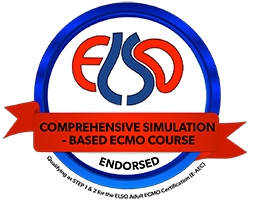
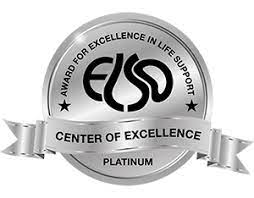
UPMC is an experienced, high-volume ECMO Center and is an ELSO Center of Excellence.
Continuing Education Credits can only be claimed when participating in the activity while it is happening (via Zoom or in-person). Credits cannot be claimed for reviewing videos of lectures after the course.
Upcoming Course Dates
Register for October 16, 2025 to October 18, 2025 Course >>
Tuition:
$3,000.00 (includes the ELSO Red Book)
All cancellations must be sent via email, Keri Hickman.
Cancellation Policy
Cancellations received before 9/16/25 will be refunded in full. After 9/16/25, a $1,500 fee will be assessed, and no refunds will be made after 10/9/25.
Questions?
Contact Keri Hickman CCP, LP
Director, ECMO Management
University of Pittsburgh Medical Center Presbyterian
E-mail: ProcircaECMO@procirca.com



